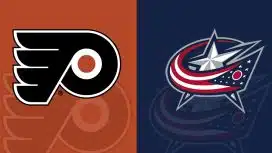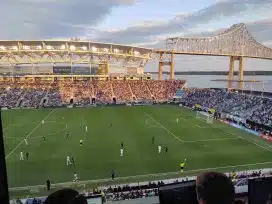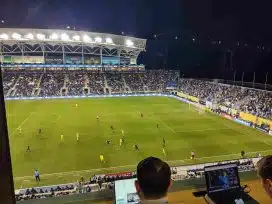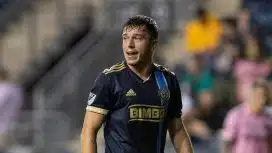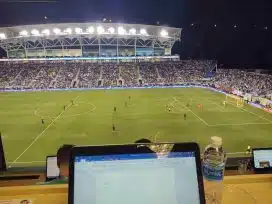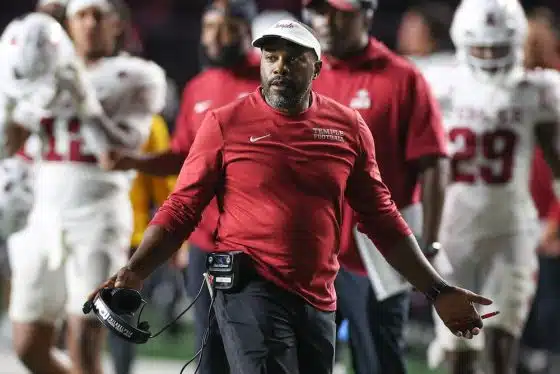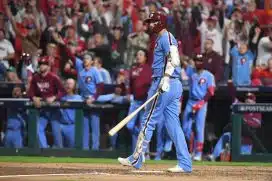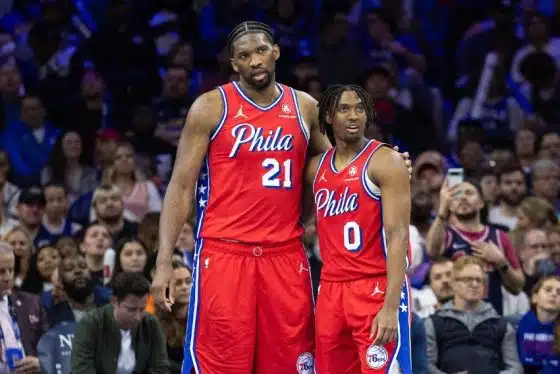Uncategorized
Mason Focused on Parlaying New Summer Regimen into Fast Start
Until this summer, Flyers goaltender Steve Mason spent most of his off-seasons playing as a forward in an Ontario ball hockey league and working out on the ice with a group of friends who play professionally in the National Hockey League and other circuits. Coming off a statistical career year in 2014-15 and having played well for the Flyers on a consistent basis ever since his arrival late in the lockout-shortened 2012-13 season, no one would have faulted Mason if he took an "if it ain't broke, don't fix it" approach to his 2015 off-season.
Mason, however, was not satisfied with last season. Despite his outstanding personal statistics, the team missed the playoffs due primarily to an atrocious road record and sub-par penalty killing. From an individual standpoint, the season saw its share of frustration and injury.
Last summer, Mason sustained a broken right pinky finger in a ball hockey game. While not a serious injury, the injury to a finger on his glove hand temporarily set back his pre-camp preparation timetable. Mason got off to a slow start in October, although the summertime injury was not a significant cause. On a much more concerning note, Mason missed significant time in the middle of the season due to back spasms and a nagging knee problem that eventually required an in-season arthroscopic meniscectomy to remove 60 percent of the meniscus in his right knee.
Mason, who appeared in 61 games for the Flyers during the 2013-14 season before being limited by the knee issue to 51 games last season, set a goal to be physically ready to play 60-plus games even with the team's free agent acquisition of 1B starter-quality backup Michal Neuvirth in July. He also set a personal goal to have the strongest training camp and preseason of his professional career to date.
The first step was an easy one to take.
"I quit playing ball hockey this summer," said Mason during the Flyers' training camp in Voorhees, NJ. "Too much pounding on my knees."
Mason had always enjoyed getting together with buddies and showing off his stick-handling and shooting prowess as a forward in the Ontario-based Players Ball Hockey League (PBHL). Although primarily an outlet for fun and bragging rights, Mason excelled in his off-season hobby. In 45 games, Mason compiled 69 goals and 127 points; his 2.82 points-per-game average ranked third in the league's history.
Nevertheless, giving up ball hockey was a no-brainer after the knee surgery. Mason knew his professional ice hockey goaltending career had to take top priority over any off-season avocation.
The second step was more important and dramatic: for the first time in his career, Mason sought out summertime individualized goaltending coaching.
Last year, Mason could not help but notice that veteran goaltender Rob Zepp reported to the Flyers' training camp in phenomenal physical condition and was extremely sharp in net throughout training camp and his preseason appearances. Zepp, signed to be the organization's American Hockey League starting goaltender and third-string NHL netminder was ahead of either starting goalie Mason or primary backup Ray Emery during the preseason.
Zepp, a fitness fanatic and stickler for year-round preparation, shared elements of his offseason program with his colleague. Most notably, Zepp recommended that Mason contact goaltending instructor David Franco about working together during the offseason.
The back-story: During his formative years as a young goaltender in the early 2000s, Zepp never had access to a goaltending coach, even when he played in the minor leagues as a Carolina Hurricanes prospect. Zepp took the initiative upon himself to seek out the help of brothers Marco and David Franco, who most famously worked with Curtis Joseph and Jamie Storr when both players were in the NHL.
Working with the Franco brothers was a developmental eye-opener for Zepp. He realized just how much room there is even for a professional goalie to improve his technique.
"We worked a lot on presenting myself bigger. My glove was turned in, my hands were tight, my stance was narrow. We worked on those things," recalled Zepp
"Before that, I wasn't learning things like pushing on your power leg and getting up on your right. I was getting up to get up. Those were the big things we worked on early, and I stayed with that."
Although Zepp subsequently worked with numerous other skilled goaltending coaches affiliated with his professional teams — each of whom contributed useful tools and techniques to add to and fine-tune his repertoire — he maintained his offseason relationship with the Franco brothers.
Mason had heard of the Francos before but finally took the plunge to work with David Franco at Zepp's recommendation.
"My goalie partner from when I played [in the Ontario Hockey] for London told me to come out and work with [Franco] and I never did. Mow I’m starting to regret not going out and working with him. He gave me this unbelievable base to come into camp with," said Mason.
Mason, who hails from Oakville, Ont., and Zepp, who makes his home in Newmarket, Ont., worked out together during the summer in conjunction with David Franco. The sessions were grueling.
"He would run Zepper and I as the only two out on the ice," Mason said. "The one guy is in net, the other guy is trying to catch his breath, and before you could catch your breath, you were back in net.”
The intensive sessions were not only conditioning boosters but also fine-tuning tools for mechanics, fluidity and positioning ahead of coming to NHL camp. Mason, who adheres to a regimented and highly detail-oriented practice routine during the season, immersed himself in his new method of summer training. The 27-year-old netminder said there was a night-and-day difference between working with a personal goaltending coach and preparing for camp among position player friends.
“Summer hockey is tailored for [position] players. There’s no goalie drills. The guys just come down and do 3-on-0's, breakaways, and back door plays. This summer I was able to just do goalie-specific work and work on your movements, your tracking, the puck work. The shooters that we have, they aren’t just having fun out there. They’re placing shots where it’s for the goaltender’s benefit, not for the players," said Mason.
In the meantime, Mason had several dialogues with the Flyers' new goaltending coach, Kim Dillabaugh to get to know one another. The goalie, who had previously credited former coach Jeff Reese (now with the Dallas Stars) for helping him turn around his once-struggling NHL career, quickly formed a strong rapport at training camp with his new coach.
"It's been tremendous working with Kim, very comfortable and very natural," Mason said. "He is very interactive and a good communicator. He works within your baseline and helps you find way to sharpen and expand your game, whether it's tracking or your stick or glove or whatever the case may be."
For example, Dillabaugh is known to be a believer the main principles of the "head tracking" or "head trajectory" technique that has become something of a buzzword around goaltending circles. The core ideas of the technique are nothing new to the position but a butterfly position variation — with now-familiar identifying nomenclature — has gained popularity across the NHL.
Goaltenders trained in the Los Angeles Kings system, including Jonathan Quick, have all been versed in head tracking technique. Likewise, Devan Dubnyk became a devotee last season as he enjoyed a bounce back NHL season after struggling mightily the previous year.
"Tracking is something you can always improve upon as well. That's something Kim has been working with me, as practices are going on, staying in my ear just to remind me. During summertime, especially when you don't make the playoffs, it's the little things that simplify the game can get forgotten about a little bit," said Mason.
"It's great to have Kim to continually harp on the small things that turn out to be big things over the course of a game and the course of the season."
Earlier in his career, while playing for Columbus, Mason sometimes drew criticism for his conditioning level. Since coming to the Flyers, he has also made enormous strides in his off-ice aspects of preparing for the season. Flyers general manager Ron Hextall has noticed the year-by-year change.
“I think Mase [has] become a pro. He’s obviously in better shape than he was in his early career and I think the maintenance part for him, he knows his body. The nutrition part, I think all of our guys are getting better so Mase has come a long way. [When] you leave the game and you always ask people how you want to be remembered and most guys say I want to be remembered as a good teammate and a pro and I think Mase is getting to the point where he’s a good pro," said Hextall.
Many national pundits, such as Mike Milbury and Jeremy Roenick, appear to still base their critiques of Mason on outdated opinions of his consistency, conditioning and mental toughness. Mason has said the ongoing lack of respect he receives in some circles does not bother him but is a little added motivation.
Hextall opined that, while the player's maturation into a fine NHL starting goaltender may still go largely unrecognized elsewhere — or treated as a one-year revival rather than a continual upward arc since his arrival — most observers in Philadelphia realize that Mason has blossomed and still has opportunities for even further improvement.
For his part, Mason says that his only focus now is to parlay a strong preseason into a fast start in the regular season both for the team and individually. Only time will tell if that hope comes to fruition, but Mason has thus far done his part with a pair of strong outings in his two preseason games to date. He is slated to start the team's preseason finale and then get ready to backstop the club coming opening night of the regular season.
Bill Meltzer is a columnist for Flyerdelphia. Follow him on Twitter @billmeltzer.













